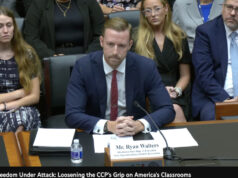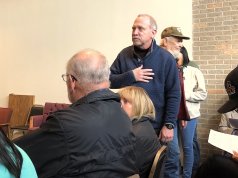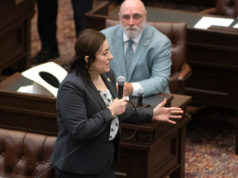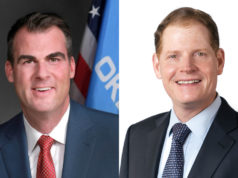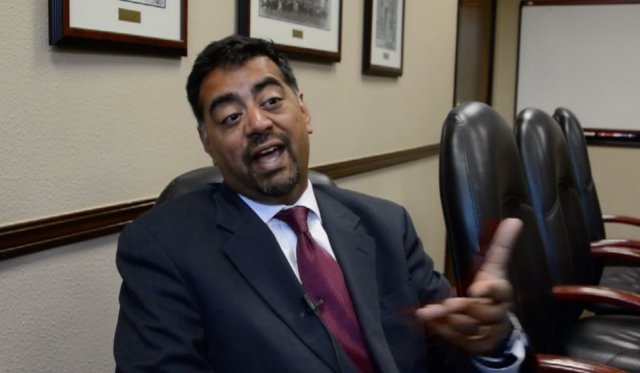

University of Oklahoma faculty members awoke to an email they never expected to read over their morning coffee. With the subject line reading, “Government investigators, auditors and agents on campus,” and the body full of dense, legal syntax, the message was clear: don’t talk to federal agents investigating conflicts of interest without first contacting university lawyers.
A widening investigation into the theft of protected research involving as many as 77 universities nationwide has OU officials pushing to replace a nearly decade-old conflict of interest policy by the end of the month.
The proposed changes come after FBI agents visited the Norman campus and OU Health Sciences Center in Oklahoma City over the summer amid “increased review of college and university activities, particularly those related to grants and contracts, controlled research, and interactions with international institutions and researchers,” according to an email from the OU Office of Legal Counsel.
While the FBI “doesn’t confirm or deny the existence of any investigation regarding any matter,” according to a spokesperson earlier this month, the FBI “maintains a presence on various campuses to engage in a myriad of law enforcement activity.”
OU general counsel Anil Gollahalli said the increased scrutiny shouldn’t come as a surprise.
“If you’ve been watching what’s going on in the national stage, the federal government has become much more interested in disclosures of conflicts of interest because of what the federal government sees as undue influence by foreign nations on our research base,” Gollahalli said. “We want to make sure that we’re in step with the best practice with where the federal government is and disclosing conflicts.”
The new policy, which is scheduled for votes next week by the university’s faculty and staff senates as well as governance groups at the OU Health Sciences Center, establishes a central committee made up of faculty and staff to review and manage conflicts of interest. Previously, oversight was left to individual departments, leading to wide variations in enforcement across campus. The new policy will be presented at the Board of Regents’ meeting on Oct. 23 for final approval.
“We can’t be sure that we’re managing conflicts appropriately if we don’t have a good policy that mandates their disclosure, right?” Gollahalli said. “What we’re doing is trying to set forth a good, solid baseline, and we’ve got to educate our faculty.”
“I think we should have had this policy in place 20 years ago,” said Amy Cerato, a presidential professor in the Gallogly College of Engineering who serves as secretary of the OU Faculty Senate.
“With the federal government making sure that we are not being influenced by international governments in terms of selling state secrets, I think the university decided that we needed to have a state-of-the-art state of the practice conflict of interest form in place to protect faculty and staff from any overreach from other entities,” she said.
The new policy, while establishing a university-wide oversight committee, generally limits employees from having significant financial interest in an outside company, use of other employees or students in a personal interest and gifts greater than $20 in value, among other provisions.
There are a number of researchers, both on the Norman campus and at the OU Health Sciences Center, with dual appointments with Chinese universities. This, in itself, is not necessarily nefarious, according to Gollahalli, but needs to be disclosed and monitored.
The National Institutes of Health put universities across the country on alert a year ago about the threat of foreign agents stealing the institutes’ funded research. In January, National Institutes of Health officials sent letters requesting information about specific researchers suspected of failing to disclose conflicts of interest to 77 institutions, according to a report in Science Magazine.
In April, the director of the National Institutes of Health told Congress his department has been working with the FBI to investigate 55 institutions for conflicts of interest.
One program under particular scrutiny is China’s Thousand Talents program, which is an initiative sponsored by the Chinese government to recruit ethnic Chinese researchers who work or study overseas. While the program itself is far from secret, American intelligence officials say the program’s clandestine mission is to facilitate the transfer of technology back to China.
There are currently researchers affiliated with the program working at OU, according to an OU scientist.
The threat isn’t limited to universities. Last December, a Chinese-educated researcher working for Phillips 66 in Bartlesville, Oklahoma, was arrested on charges of stealing trade secrets worth an estimated $1 billion, according to the U.S. Department of Justice.
Last month, a federal grand jury indicted a Chinese researcher from the University of Kansas on charges of lying to university officials about a contract with a Chinese university. Earlier this summer, Chinese researchers at the University of Texas MD Anderson Cancer Center in Houston and Emory University in Atlanta were dismissed for failing to disclose ties to China.
In Chicago, a 28-year-old Illinois Institute of Technology graduate student is being held in the federal Metropolitan Correctional Center pending trial on charges of being a spy for the People’s Republic of China. He is among more than 2,600 Chinese nationals who claim to work for two U.S. companies that do not exist, according to court records.
The federal focus on Chinese researchers has prompted accusations of racial profiling at other institutions, including from MD Anderson Cancer Center researchers who accused administrators of racial bias following firings for undisclosed ties to China, Science Magazine reported.










